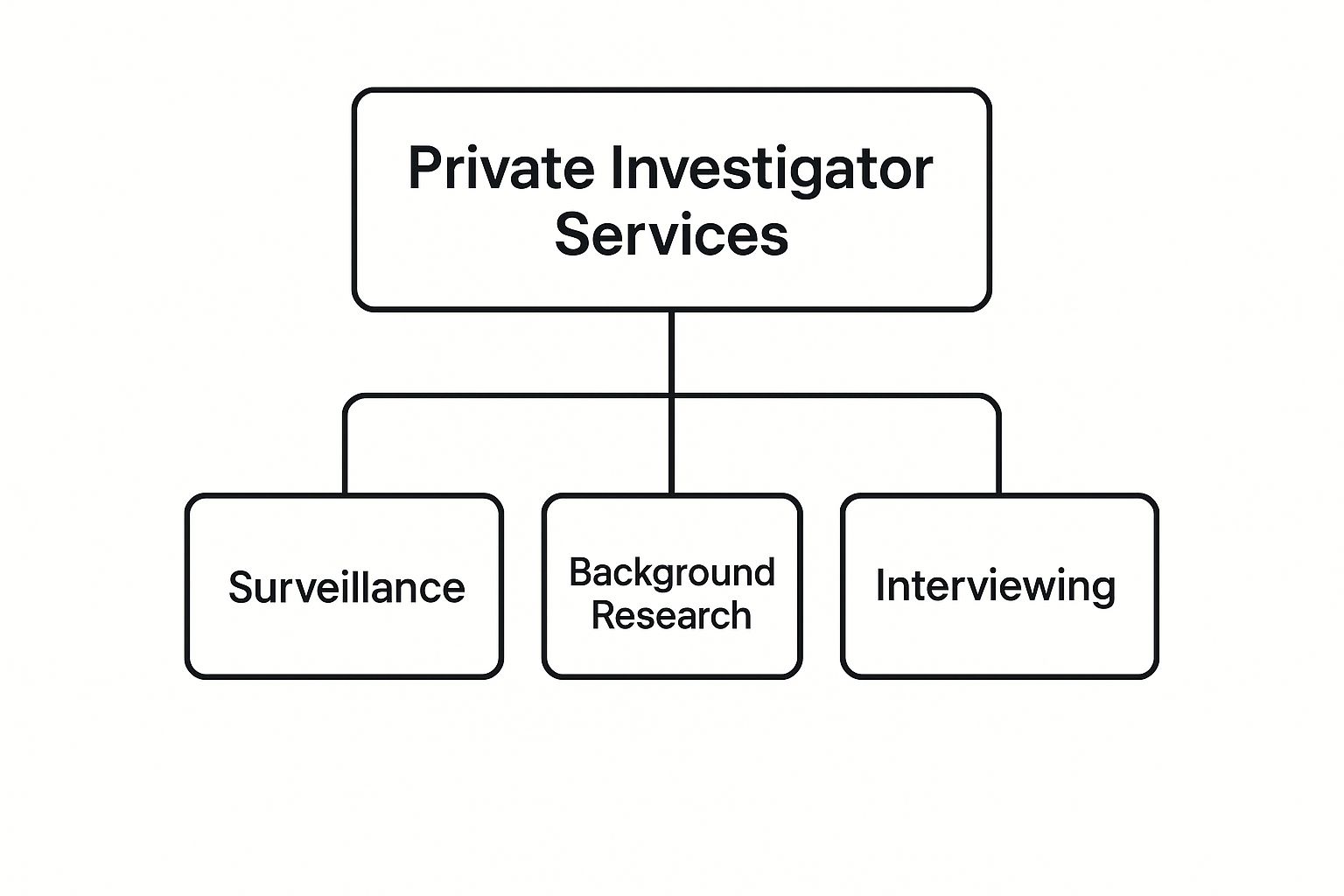Forget the old stereotypes you’ve seen in films—the shadowy figure in a trench coat lurking in a rainy alley. A modern private investigator is a highly skilled professional who legally and ethically gathers information for a huge range of clients, from major corporations to everyday individuals.
Their real job is to uncover the facts and bring clarity to complex or confusing situations. Think of them as professional truth-finders.
Beyond the Trench Coat: What PIs Really Do
A better way to picture a private investigator is as a meticulous problem-solver, not a spy. Their primary role is to collect, analyse, and present information that a client simply can’t get on their own. This isn’t about bending or breaking the law; it’s about navigating it with expertise to find the answers you need.
So, what does a private investigator actually do day-to-day? Their work is incredibly varied. One day might be spent discreetly observing a subject to document their activities for a matrimonial case. The next could involve delving into public records and financial documents to get to the bottom of suspected corporate fraud.
Core Disciplines of Investigation
The work of a PI generally boils down to a few key areas of expertise. These foundational skills are the bedrock of almost every investigation, whether it’s a personal matter or a complex corporate case.
This image shows how a PI’s services all branch out from three main pillars: surveillance, research, and interviewing.

As you can see, these three disciplines are the engine driving their work, allowing them to gather evidence from multiple angles. It’s this comprehensive approach that ensures the information they deliver is both reliable and robust.
Generally, their services are split between two main groups:
- For Individuals: People often need help with deeply personal issues. This could be anything from suspected infidelity and finding a missing person to gathering crucial evidence for a child custody dispute. In these sensitive cases, the investigator provides not just evidence, but often, much-needed peace of mind.
- For Businesses: Companies and law firms hire investigators to manage and mitigate risk. Common tasks include carrying out due diligence on potential business partners, investigating internal theft or fraud, and conducting thorough background checks on key employees to safeguard company assets and reputation.
To give you a clearer idea of the breadth of their work, this table breaks down some of the most common services.
Core Services of UK Private Investigators
| Service Area | Common Tasks | Who It Helps |
|---|---|---|
| Surveillance | Discreetly observing and documenting a person’s activities, movements, and interactions. | Individuals suspecting infidelity; businesses monitoring fraudulent injury claims. |
| Tracing & Locating | Finding missing persons, lost relatives, or debtors who have disappeared. | Families searching for loved ones; landlords and creditors seeking to recover debts. |
| Background Checks | Vetting potential employees, business partners, or new romantic partners by verifying their history and credentials. | Employers, investors, and individuals entering new relationships. |
| Corporate Investigations | Investigating internal issues like employee theft, fraud, intellectual property theft, or corporate espionage. | Businesses of all sizes looking to protect their assets and integrity. |
| Legal & Litigation Support | Gathering evidence, serving legal documents (process serving), and locating witnesses for court cases. | Solicitors, legal firms, and individuals involved in civil or criminal litigation. |
| Digital Forensics | Recovering data from electronic devices to uncover digital evidence related to fraud, harassment, or other misconduct. | Corporate clients and individuals needing proof from digital communications. |
As you can see, the skillset is incredibly diverse, requiring a blend of traditional field craft and modern technical know-how.
An investigator’s real value lies in their ability to connect disparate pieces of information. They find the story hidden within public records, digital footprints, and quiet observation, presenting it as a clear, factual report.
The Modern Investigator’s Toolkit

To get a real sense of what a private investigator does, you have to look at the tools they use to get the job done. Forget the old-school image of a magnifying glass and a notepad. Today’s PI relies on a sophisticated mix of traditional fieldwork and advanced technology, all handled with a sharp awareness of UK law. Their work is one part methodical research, one part creative problem-solving.
Think of an effective investigator as a cross between a seasoned journalist and a data analyst. They don’t just find bits of information; they dig into it, check it, and piece the fragments together until a clear, evidence-based picture emerges for their client. This whole process demands a strategic mind, knowing exactly which tool to pull out of the bag and, crucially, when to use it.
Take surveillance, for instance. It’s a world away from just sitting in a car for hours on end. It involves careful planning and a thorough risk assessment. While modern surveillance often relies on high-tech gear, its success still comes down to the investigator’s patience, discretion, and knack for blending into any environment.
Combining Physical and Digital Methods
The most powerful investigations are almost always a blend of boots-on-the-ground legwork and digital reconnaissance. A PI might follow a subject to see where they go, then later analyse their public social media posts to build a fuller understanding of their routines and connections. The aim is always to create a timeline of events backed up by different kinds of evidence.
This layered approach makes the final findings solid and difficult to challenge. It’s all about building up layers of proof.
- Public Record Searches: Investigators are masters at navigating the vast databases that hold information on property ownership, company directorships, and court records. This is often where the first crucial leads of a case are found.
- Human Intelligence (HUMINT): Simply talking to people is still at the heart of investigative work. A skilled PI knows how to conduct interviews to gather information without ringing alarm bells, gently steering conversations to uncover vital details.
- Static and Mobile Surveillance: This is the classic practice of observing a location or following a person to document what they do. It demands incredible patience and strict adherence to legal lines to avoid any hint of harassment or privacy invasion.
It’s a common myth that PIs operate in some kind of legal grey area. The truth is, every single action is shaped by regulations like GDPR and the Human Rights Act. Any evidence gathered illegally is worthless in court and can land both the investigator and their client in serious legal trouble.
Using Technology Ethically
Technology has massively expanded what an investigator can do, especially online. Finding people or unearthing hidden information now heavily relies on analysing their digital footprint. This calls for a very specific skillset to navigate the online world both effectively and legally. In fact, the work of a private cyber investigator is now essential for dealing with modern problems like online harassment, data breaches, or digital fraud.
But technology is always used with precision and strictly within the law. For example, a PI can legally place a GPS tracker on a vehicle their client owns to monitor its movements. What they absolutely cannot do is plant a listening device inside someone’s private home. Knowing the difference is what separates a professional, ethical investigator from the rest. The modern PI’s toolkit isn’t about breaking the rules—it’s about expertly working within them to find the truth.
Protecting Businesses from Hidden Risks

It’s not all personal drama. A huge part of a private investigator’s world is dedicated to safeguarding businesses. In the corporate arena, unseen risks can quickly spiral into financial disaster, a tarnished reputation, or messy legal battles. Think of investigators as a company’s first line of defence, tasked with uncovering threats before they become full-blown crises.
Let’s say a tech firm has a gut feeling that a top executive is leaking valuable trade secrets to a rival. It’s an incredibly sensitive situation. One wrong move could spark a lawsuit or, worse, tip off the suspect. This is precisely where a professional investigator proves their worth.
A Strategic Approach to Corporate Cases
An experienced PI won’t go in all guns blazing. Instead, they’ll start a quiet, multi-layered investigation designed to gather solid, undeniable proof. This methodical process ensures every step is legally sound and builds a case that can’t be picked apart.
This kind of approach usually unfolds in several stages:
- Discreet Surveillance: The investigator might monitor the executive’s activities outside the office, documenting any clandestine meetings with competitors.
- Digital Forensics: With the right permissions, they can legally examine company-owned laptops and phones to find deleted emails, track data transfers, or uncover other digital footprints.
- Human Intelligence: This involves carefully talking to colleagues—without raising alarm bells—to piece together a picture of unusual behaviour or out-of-character actions.
By weaving these techniques together, the investigator can construct a clear timeline of events, all backed by hard evidence. The whole point is to give the business the clarity it needs to act, whether that means firing someone, taking legal action, or simply tightening up internal security.
Corporate investigations aren’t just about catching people out. They’re about giving company leaders verified intelligence so they can make smart, strategic decisions that protect the entire organisation.
Essential Services for Business Integrity
The work goes far beyond just plugging a single leak. Private investigators offer a whole suite of services designed to strengthen a business against all sorts of threats, both inside and out. It’s often a proactive step to keep the company stable and maintain its integrity. If this is an area that interests you, you can explore the different types of corporate investigations in our detailed guide.
Some of the most common corporate services include:
- Employee Background Checks: Properly vetting new hires, particularly for senior positions, to confirm their history and make sure they don’t represent a hidden risk.
- Internal Fraud Investigations: Getting to the bottom of schemes like expense account abuse, embezzlement, or supplier kickbacks that quietly drain a company’s finances.
- Due Diligence: Vetting potential business partners, acquisitions, or major investment opportunities to uncover any liabilities or red flags before contracts are signed.
And the need for these services is only increasing. The global market for private investigation services was valued at USD 21.1 billion in 2025 and is set to keep growing. This trend really highlights how essential investigators have become in helping UK businesses navigate an increasingly complex commercial world.
Navigating Sensitive Personal and Family Matters
For most people, the thought of hiring a private investigator only comes up during times of incredible personal stress. These aren’t businesses looking to manage risk; they’re individuals searching for answers to profoundly difficult, often heartbreaking, questions. A huge part of what we do involves navigating these sensitive family situations with total discretion, empathy, and professionalism.
The work is incredibly varied. One day we might be helping an adopted adult find their birth parents, and the next we’re gathering evidence for a difficult child custody battle. In every single case, our job is to work within a strict legal and ethical framework to bring clarity to a confusing situation. We’re there to provide either peace of mind or the hard facts needed for legal action, empowering our clients to move forward.
Finding a Long-Lost Family Member
Think about trying to find a sibling you were separated from as a child. You’ve spent years hitting brick walls with public records, and the trail has gone completely cold. This is exactly the kind of situation where our specialised skills can make all the difference.
It’s a methodical process, not magic.
- Initial Database Search: We start by digging into restricted-access databases, electoral rolls, and historical records that the general public can’t get to. This first step often turns up old addresses or even name changes.
- Digital Footprint Analysis: From there, we begin piecing together a digital footprint. We look through social media, public forums, and other online nooks and crannies for clues about the person’s current life and location.
- Boots-on-the-Ground Enquiries: If the digital trail isn’t enough, we get out on the ground. This could mean discreetly visiting old neighbourhoods or speaking to former neighbours to trace the person’s movements over the years.
An investigator’s real value here is the ability to connect dots scattered across decades of fragmented information. We follow a logical process, turning tiny clues into solid leads until we can respectfully and successfully locate the individual.
Handling Infidelity and Custody Cases
Other deeply personal cases revolve around suspected cheating or concerns about a child’s welfare. When a relationship is falling apart, emotions are raw, and objective evidence is what truly matters. This is where a skilled investigator provides clarity. To get a better sense of how we handle these delicate situations, you can learn more about the role of a private investigator for infidelity.
In these cases, we offer impartial evidence through surveillance and careful documentation. For example, in particularly toxic situations like co-parenting with a narcissistic parent, an investigator can document behaviour that might be crucial for legal proceedings and protecting a child’s well-being. This evidence isn’t about picking sides; it’s about creating a factual, unbiased record to help the courts make the right decision for the children involved.
Uncovering Clues in the Digital World
So much of our lives have moved online, and with them, the clues people leave behind. It’s no surprise, then, that a huge part of a modern private investigator’s job is navigating this digital realm. This field, known as digital forensics, has turned PIs into a sort of modern-day digital archaeologist.
They meticulously sift through electronic data to unearth crucial facts. This could mean pulling up deleted emails to prove corporate wrongdoing, tracking down the source of anonymous online harassment, or digging into a complex data breach to find out how it happened and who was responsible. It’s painstaking work that demands a sharp technical mind and a real understanding of how people behave online.
For businesses, a digital PI might perform ‘digital reconnaissance’ to vet a potential partner by examining their online footprint. For an individual, they could be the key to exposing an online scam or finally putting a name to an anonymous bully, gathering the solid proof needed to stop them.
The Digital Toolbox
A digital investigator’s methods are precise, methodical, and always legally sound. The main goal is to retrieve information without changing it in any way. A lot of their work involves analysing metadata—the data about data, like the time a file was created or the location a photo was taken.
Today’s investigators use a variety of tools, including advanced data scraping techniques, to systematically gather publicly available information from across the internet. This allows them to piece together a complete picture from what might otherwise seem like random, scattered bits of information.
These digital skills are vital in all sorts of cases:
- Online Harassment: Finding the real person behind the anonymous account causing so much distress.
- Data Breach Investigations: For a corporate client, tracing the source and scale of a security breach.
- Intellectual Property Theft: Locating the digital trail of an employee sending sensitive company files to a competitor.
The heart of digital forensics isn’t about hacking. It’s about preservation and analysis. A digital PI makes a perfect copy of a device’s data and works from that duplicate, which keeps the original evidence pristine and admissible in court.
This expertise has dramatically expanded what a modern investigator can do. Social media analysis and digital forensics have made collecting evidence more thorough and efficient than ever before. This is why UK private investigators have become absolutely essential for complex digital cases in almost every sector.
Of course, this digital work often dovetails with old-school methods. Discovering a suspicious phone number online is one piece of the puzzle, but finding out who it belongs to requires another set of skills entirely. Our guide on tracing telephone numbers in the UK explains exactly how that process works.
How to Hire a Private Investigator

Taking that first step to hire a private investigator can feel like a huge decision, but finding the right professional for the job doesn’t need to be overwhelming. The trick is to be systematic and thorough, just as you would when hiring any other expert. A little due diligence now saves a lot of headaches later.
It’s worth knowing that the private investigation industry in the UK isn’t currently government-licensed. This reality puts the responsibility squarely on your shoulders to check an investigator’s background and credibility. A genuinely professional PI will understand this and be completely open about their experience and credentials.
Vetting Your Potential Investigator
Before you agree to anything, you need to ask some direct questions. Any reputable investigator will expect and welcome this—it’s a sign of a serious client. Think of the initial chat as a two-way interview; you’re sizing them up, and they’re assessing if they can genuinely help you.
Here are the non-negotiables to look for:
- Professional Affiliations: A good starting point is membership in a recognised industry body, like the Association of British Investigators (ABI). These organisations usually vet their members, ensuring they meet certain professional standards.
- Insurance: Always ask to see proof of their Professional Indemnity Insurance. This isn’t just a piece of paper; it’s your protection and a clear sign that they run a legitimate, professional business.
- ICO Registration: To handle personal data legally in the UK, an investigator must be registered with the Information Commissioner’s Office (ICO). There are no exceptions to this.
A trustworthy investigator’s main aim during a consultation is to understand your problem and figure out if they can help you legally and ethically. If anyone promises a specific outcome or hints at using illegal methods, that’s your cue to end the conversation and walk away.
Understanding the Process and Costs
Once you’re satisfied with their credentials, it’s time to get down to the brass tacks of your case. Be ready to share the details candidly—the more information you can give them upfront, the more effective and efficient their work will be.
The final piece of the puzzle is making the arrangement official. Never proceed without a clear contract or a formal letter of agreement. This document should spell out exactly what work will be done, the fees you’ve agreed on, and a clause on confidentiality. Properly understanding how to hire a private investigator is the key to getting the results you need and ensures everyone is protected from start to finish.
Got Questions Before You Hire a PI?
Even when you know what a private investigator does, actually picking up the phone to hire one can feel like a big step. It’s completely normal to have a few questions buzzing around your head, from the legal side of things to what it’s all going to cost. Let’s clear up some of those common queries right now.
The first, and biggest, question for most people is straightforward: is this even legal?
Absolutely. Hiring a private investigator in the UK is 100% legal. A professional PI operates squarely within the law, including all the nuances of GDPR and privacy regulations. In fact, that’s a huge part of their value—they know how to gather evidence that will stand up in court, helping your case without causing any legal headaches for you down the line.
This is the key difference between a seasoned professional and someone just snooping around. A pro’s job is to uncover facts, not to bend the rules.
What to Expect on the Invoice
The next big question is always about the cost. What kind of budget do you need to hire a private investigator?
There’s no single answer, as the price really depends on the complexity of the job, the investigator’s experience, and the kind of work you need done. Most PIs in the UK work on an hourly rate, which can range anywhere from £40 to over £100 an hour, plus expenses like fuel or travel. For more defined jobs, like a basic background check, you might be offered a fixed, flat fee.
To make sure everything is above board, you should always be given a clear breakdown of their fee structure and sign a contract before they start. It’s a simple step that protects everyone involved.
How You Can Help Your Investigator
Finally, what do you need to bring to the table? To give your investigator the best shot at a successful outcome, what information is most helpful?
The simple answer is: the more, the better. Giving them a solid starting point makes their work far more efficient and effective.
- Looking for a missing person? A full name, date of birth, their last known whereabouts, and a clear, recent photo are the essentials.
- Worried about fraud in your business? Hand over any relevant documents, a timeline of when things started to seem off, and the names of anyone you suspect might be involved.
Being open and honest from the very first conversation is crucial. It lets the PI get a proper feel for the situation and map out the best way forward for your specific case.
If you need discreet, professional help to find the answers you’re looking for, the team at UK Private Investigators is ready to listen. Contact us today for a confidential consultation.

